The Lost Daughter Read online
Page 5
She felt the edge of a skirt and groped until she could find the body. A tiny waist. Soft hair. “Anastasia?” she whispered, and two arms were flung around her neck. Anastasia was panting with fear and Maria clung to her.
The firing stopped as suddenly as it had started and she heard the men talking in low voices, then they stepped outside the room. Perhaps they had decided to let the women live. Surely they must.
“Are you hurt?” Maria whispered, but Anastasia couldn’t speak. As the smoke began to clear a little, Maria realized her sister’s eyes were wide with shock. She followed the direction of her gaze and saw their mother on the floor in front of them with part of her skull missing. She retched. There were brains everywhere, white and glistening. Her mother’s brains.
She could hear moaning. Women’s voices. The others were alive. They had to get out of there. She should crawl toward Olga, ask her what to do, but she couldn’t leave Anastasia.
The respite didn’t last long. Yurovsky came back into the room alongside a big man with wild dark hair. A long knife glinted in his hand. Maria tried to twist out of the way as he raised it and brought it down toward her, but she felt it slash her middle and she screamed with all her might. Then Yurovsky raised his gun and pointed it at her head, and she looked up into his cold killer’s eyes just before she lost consciousness.
Chapter 7
THERE WAS COOL NIGHT AIR ON HER FACE. MOVEMENT. Pain. Maria realized she was being carried, slung over someone’s shoulder. They were walking. Then they stopped. Other hands were on her. She was lifted and thrown, landing on a surface that was uneven. She was only part-conscious but knew she must keep her eyes shut, stay still.
Someone lifted her wrist, pressed fingers to her pulse. She held her breath. Now they would find out she was alive.
“This one’s gone,” said a voice that sounded like Yurovsky. The voice of her murderer.
Maybe he was right; perhaps she was dead. But she didn’t think so.
There was a thump as something landed beside her and she knew it was another body. She desperately wanted to open her eyes, to reach out, see who it was, but she was frozen in terror. How could they not hear her heart thudding?
Another thump. Were any of the rest of her family alive? At least she knew Tatiana was safe and prayed she would arrive soon with Dmitri Malama to rescue them. Someone must have heard the firing. The noise had been ear-splitting. The whole town must have heard.
There were men’s voices around her. It sounded as if there were lots of them, and among the words she could hear the unmistakable sound of vomiting. More than one of the men was throwing up. It must be a grisly sight. The image of her mother’s brains flashed into her mind and she swallowed hard.
Someone grabbed at the amulet around her neck and yanked it off, breaking the chain. Another tugged at her gold bracelet, forcing it over her hand.
An engine started and she could feel vibrations beneath her. A cover was thrown over them, then they started to move. Where were they going? She could smell gas fumes; they were making her woozy. And then she drifted into unconsciousness once more.
* * *
Maria wakened to a rough jolting. It took a few moments before she remembered where she was and a stab of terror took her breath away. The vehicle appeared to be on a track of some kind, because she was being bumped around. She reached out and felt an arm. Whose was it? She couldn’t tell, but it was not moving. On the other side she felt a woman’s hair, but could detect no sign that anyone else was breathing. There was pain in every part of her but she couldn’t think about it, not now.
The vehicle stopped and she heard voices. Men’s voices with rough accents. Someone pulled back the tarpaulin over them and she held her breath, rigid with fear.
“We were promised the girls would be alive,” a voice complained close by.
“You don’t fancy a spot of necrophilia? Personally, it’s not my thing.”
“They were pretty, but look at all that blood. Fair turns your stomach.”
The men had intended to molest them, Maria realized. What would happen if they found she was alive? It would be a fate worse than death. She wished she had died back at the Ipatiev House rather than face this.
“Breakfast is ready,” a voice called from some distance away.
“We’ll strip them after,” one man said. “Bet they’ve got jewels hidden on them.”
“Yeah, I can’t wait to see their jewels,” another said in a coarse tone, and there was general laughter.
Maria listened as the voices grew fainter. She had to get away before they returned and discovered she was alive. She strained her ears, listening hard for the sound of breathing or footsteps that would indicate there was anyone nearby, but the voices were distant now. Above her she could hear leaves rustling faintly in the breeze. She opened her eyelids just a fraction and saw starry sky through dark branches.
Still there was no sound nearby, and she opened her eyes a little more and turned her head to see where she was, then gasped in terror. Someone was there. It was Peter Vasnetsov, the guard from the house. He was standing right by the truck, his eyes wide in shock to see that she was alive.
“Help me,” Maria pleaded in a whisper, her eyes fixed on his.
He glanced over to where the other guards were gathered, as if about to call them. Then he looked at her. In one swift movement he slid her off the back of the truck, pulling her legs from beneath the tarpaulin, then slung her over his shoulder and ran full tilt toward the edge of the forest.
Chapter 8
Sydney, October 20, 1973
VAL THREW TOGETHER A CHICKEN AND PINEAPPLE casserole from a recipe in Women’s Weekly. She’d serve it with boiled rice, and some leftover sponge roll for dessert. Tony always insisted on dessert.
She cleaned the kitchen, careful not to leave any smears on the work surfaces, then glanced at the clock: ten minutes before she planned to leave. Queen Elizabeth II was opening the new Opera House down at Bennelong Point and Val hoped she could push her way to the front of the crowd to see her in the flesh, maybe even shake her hand. She’d been practicing her curtsies just in case.
Val was fascinated by the pretty English queen, just eight years her senior, and her dashing husband, Philip. In photos they looked as if they were madly in love. Val had read in a magazine that Elizabeth had had to fight to be allowed to marry him: her parents felt he was not her equal as he was just a Greek prince in exile, without much money, while she was heir to the British throne. They had been writing to each other since she was thirteen, and finally overcame parental opposition and got married when she was twenty-one, in a glitzy ceremony that was straight out of a fairy tale, with gilded coaches, frock-coated footmen, and a flowing white dress.
Val’s father had opposed her marriage to Tony, which meant they’d had to wait till after her eighteenth birthday before they slipped off to tie the knot. He said Tony wasn’t ambitious enough, and objected to the fact that his family was Catholic. “They’ll expect you to raise twenty kids,” he warned, and told her she was too young to know what she was getting into. She should have listened. She’d been so naïve back then, so desperate to escape from the gulag conditions at home with her Russian father, that she hadn’t realized the trap she was falling into.
If only she’d had a mom to offer advice, things might have been different, but her Chinese mother had left home five years earlier. She’d just walked out without so much as a goodbye. Val’s dad said it was because she didn’t love them anymore, but that had never made sense. Val had heaps of memories of a warm, affectionate woman who used to build elaborate sandcastles, who taught her old Chinese songs about tigers and pandas, and made her favorite jam sandwiches cut into butterfly shapes. It had never made sense that she’d left them.
Val’s teenage years had been overshadowed by that huge, baffling loss, and when Tony came along calling her “princess,” buying her presents and telling her she was beautiful, she fell into his arms. She was lonel
y and desperate to be loved, and he seemed a catch. He was good at math and planned to work in finance. He played for the rugby team, so he was strong and fit. She was only slight in stature and she liked the fact that he was so much bigger. Why did he pick her out of all the prettier, more confident girls in their year? When she asked, he said he liked being her first boyfriend, because he didn’t want a girl who’d been around the block. He could tell she was unhappy and he wanted to be the one to rescue her; she was precious and special and he loved her with all his heart.
Looking back, it was easy to see the moments when she should have walked away. The first time Tony slapped her was the week before their wedding, when she shrank one of his shirts in a hot wash. He tried to make a joke of it, but the slap hurt and left a stinging puce mark on her cheek that she had to cover with pancake makeup. On their beach-resort honeymoon she was sore and bleeding from the roughness of the sex, but still he wanted more and she had to bury her face in the pillows to muffle her cries of pain. But it was around three months into the marriage that she learned the true nature of her Jekyll and Hyde husband.
She’d spent a couple of hours that afternoon sitting in the sunny backyard reading a library book she simply couldn’t put down. Dinner was prepared, because she knew Tony liked to eat as soon as he got in the door at five thirty, but she’d forgotten to clean his boots, which had gotten muddy during a weekend hike in the Blue Mountains.
“Hey, baby,” he’d said, coming into the kitchen and sitting at the table. “What’s cooking?” He grabbed her butt and squeezed as she walked past, then his eyes scanned the room and alighted on the boots still on the mat by the back door.
She opened her mouth to tell him about the meal, but before she could speak, he’d leaped to his feet, gripped the back of her neck, and forced her head around so she was looking at the boots.
“What the bloody hell have you been doing all day?” he asked. “Gallivanting around town? Got yourself a fancy man?”
“I’ve been in the yard . . .” she replied, her voice trembling.
“In the yard. Relaxing, I suppose. Getting a bit of sun.” His voice was soothing, singsong, then it changed abruptly. “While I’ve been slaving away earning the money to pay for your bloody idle lifestyle.” He yanked her hair back, pulled her face close to his. “Do you think I like my job? Do you?”
He seemed to want an answer, so she shook her head, desperately trying to think of a way to calm him down.
“Don’t you think I would rather be home, sitting in the sun in the yard?” A vein was bulging on his forehead and spittle sprayed her face.
“I’m sorry,” she whispered. “It won’t happen again.”
He shook his head, pursing his lips. “You say that, but how can I believe you? Thing is, words are easy and I’m not here all day to keep an eye on you. I think you need something to remind you.” He grabbed her left wrist, thumb on one side, fingers wrapped around, and bent her hand backward.
“Please, Tony,” she begged, trying to wriggle free of his grip.
He gave a sudden, vicious twist and she heard the bone crack before she felt it, like the sound when you pull apart the joints of a chicken. She screamed in shock and a wave of giddiness washed over her.
Tony pulled her in for a hug, his tone loving now. “You understand why I had to do that, don’t you?” He kissed her temple on the hairline, and stroked her long black hair.
It hurt so much that Val was shaking convulsively. “I need to go to the hospital,” she stuttered. “You’ve broken my wrist.”
“I’ll take you once I’ve had dinner,” he said, gripping her shoulders and turning her toward the oven. “We don’t want food going to waste. It’s not as if I’m made of money.”
Val fashioned a sling from a tea towel, holding a corner between her teeth while she tied the knot. Next, she got an aspirin from the cupboard and swallowed it with some water, her hand shaking so violently the glass clattered against her teeth.
“Hurry up,” Tony urged. “Sooner we eat, sooner I’ll take you to hospital. We’d better decide what you’re going to say.” He regarded her with narrowed eyes. “Probably best tell them you tripped over the porch step and fell awkwardly. That’ll work.”
Val served the dinner with one hand but felt too sick to eat. Vomit rose in her throat, and her wrist throbbed with a sickening pain that radiated up her arm into her neck.
At the hospital, Tony was every inch the loving husband, joking with the nurses about Val’s clumsiness. She stayed tight-lipped but couldn’t stop shaking for hours afterward.
Her wrist set a little wonky, with a lump protruding, and it would always be weak on that side, unreliable for carrying heavy weights. But the main side-effect was that she became scared of Tony; properly scared. If he could deliberately break her wrist, what else was he capable of?
There had been plenty more slaps and pinches, kicks and shoves in the years since then, but he hadn’t broken any more bones; he didn’t need to, because the threat hung over her. If she did as he said, he was kind. They had holidays on the Gold Coast, he bought jewelry on her birthday and their wedding anniversary, they liked the same TV programs. It wasn’t all bad, but she never knew when some insignificant incident would trigger the reemergence of his angry alter ego. And she was desperate to stop that happening.
* * *
Val decided to wear her only suit for the opening of the Opera House. It was a Jackie Kennedy–style pencil skirt and box jacket in pale blue seersucker trimmed with white braid. She’d wear a pearl necklace too, so the Queen’s aides would consider her the right sort of person for the monarch to approach; they weren’t to know the pearls were fake. Of course Tony would never have let her attend the royal event, but in the seventeen years that had passed since he broke her wrist, she had developed ways of rebelling against his control. It wasn’t that the fear had lessened; she had simply gotten better at outwitting him.
He made her list all her expenditures in a lined accounts book that he checked every Sunday evening, and woe betide her if he thought she had wasted a cent; but she had found ways of siphoning off small amounts here and there, by shopping in markets that didn’t give receipts and inflating the totals. She kept the money hidden in a box on a tiny shelf between the back of her dressing table and the bedroom wall, and smiled to herself each time she was able to add a couple of dollars.
In another bid for independence, she often rushed through the chores so she could slip out for coffee with her friend Peggy. If Tony rang while she was out, she’d act puzzled. “I must have been at the store,” she’d say, or “Maybe I had the vacuum cleaner on.”
When their daughter was born in 1968, that had restricted her freedom for a while, but now that Nicole had started preschool, Val was determined to make the most of her spare time.
She brushed her hair and smeared on some pale pink lipstick, then grabbed her handbag and car keys ready to hurry out the door, but just at that moment the phone began to ring. It could be Tony checking on her, so she picked up.
“The Doyle residence,” she said in her telephone voice.
“Is that Valerie Scott?” a voice asked. A woman’s voice. “Daughter of Irwin Scott of Bondi Junction?”
She hesitated, heard the woman’s breathing down the line. “Who wants to know?”
“I’m calling from Sandy Bay nursing home in Bondi Junction. Your father has been here for six months. He named you as his next of kin.”
Val was surprised. She hadn’t realized her father had her phone number. They hadn’t spoken since she left home to marry Tony. “My father and I are estranged,” she told the woman, “so I can’t imagine why he would give my number.” Of course, she realized, he probably didn’t have anyone else.
The woman exhaled loudly. “I’m afraid your father has dementia. His mind is deteriorating rapidly and he’s started saying some very odd things. We’re not sure what to do. If they’re true, we should call the police, but you never know where dementia
patients get their ideas from. That’s why we thought we should call you first.”
“What kind of things?” Val glanced at her watch and frowned. She didn’t have time for this.
“He keeps repeating over and over ‘I didn’t want to kill her.’ Then sometimes he says ‘There was so much blood’ and wrings his hands.”
“Jeez.” Val was listening hard now. Could he be talking about her mother? Had her father killed her? She shook herself. He was an objectionable character, but not a murderer. Funny that that had been the first thought to enter her head.
“You understand we’re in a tricky position,” the woman continued. “We wondered if you would come and talk to him, see if you can find out what he’s talking about.”
Val had always suspected her father knew where her mother had gone, but had never been able to get any information out of him. If he had dementia, there was no time to be lost. “I suppose I’d better come,” she said, biting her lip, then wrote the address on the notepad by the phone, carefully ripping out the page and slipping it in her handbag so Tony wouldn’t see. “I’ll be there as soon as I can. Maybe tomorrow.”
She hurried out the door and drove to the harbor, her mind turning over the odd conversation. It didn’t make sense; at least, she hoped it didn’t.
She had to park miles away from the quayside, and by the time she arrived, the crowd was so dense there was no chance of getting near the front, but by standing on tiptoe she could see a tiny figure at a podium. Like her, the Queen was wearing pale blue: a sleeveless dress and matching hat, with white gloves. She was gripping the sheets of paper on which her speech was written as a brisk wind tried to rip them from her hands. Her refined voice echoed through loudspeakers, muffled by the sound of wind buffeting the microphone. Prince Philip sat behind her with some dignitaries Val didn’t recognize.

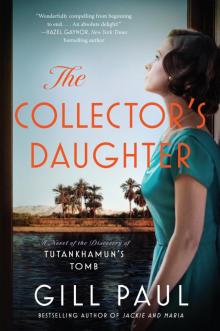 The Collector's Daughter
The Collector's Daughter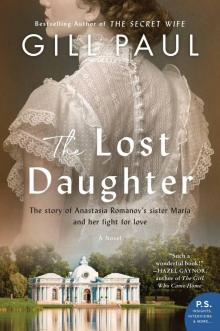 The Lost Daughter
The Lost Daughter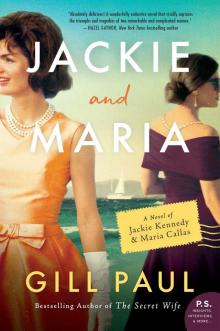 Jackie and Maria
Jackie and Maria The Affair
The Affair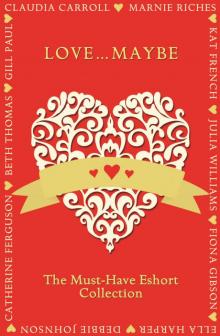 Love...Maybe
Love...Maybe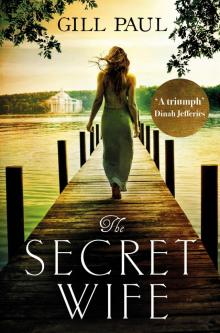 The Secret Wife
The Secret Wife No Place For a Lady
No Place For a Lady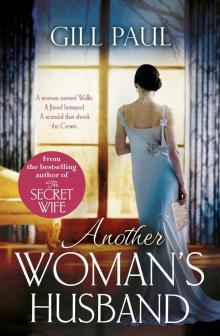 Another Woman’s Husband
Another Woman’s Husband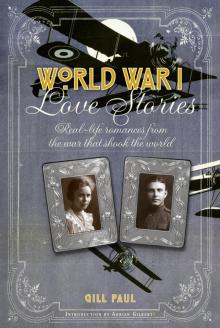 World War I Love Stories
World War I Love Stories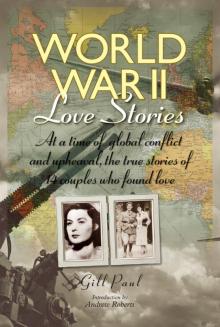 World War II Love Stories
World War II Love Stories